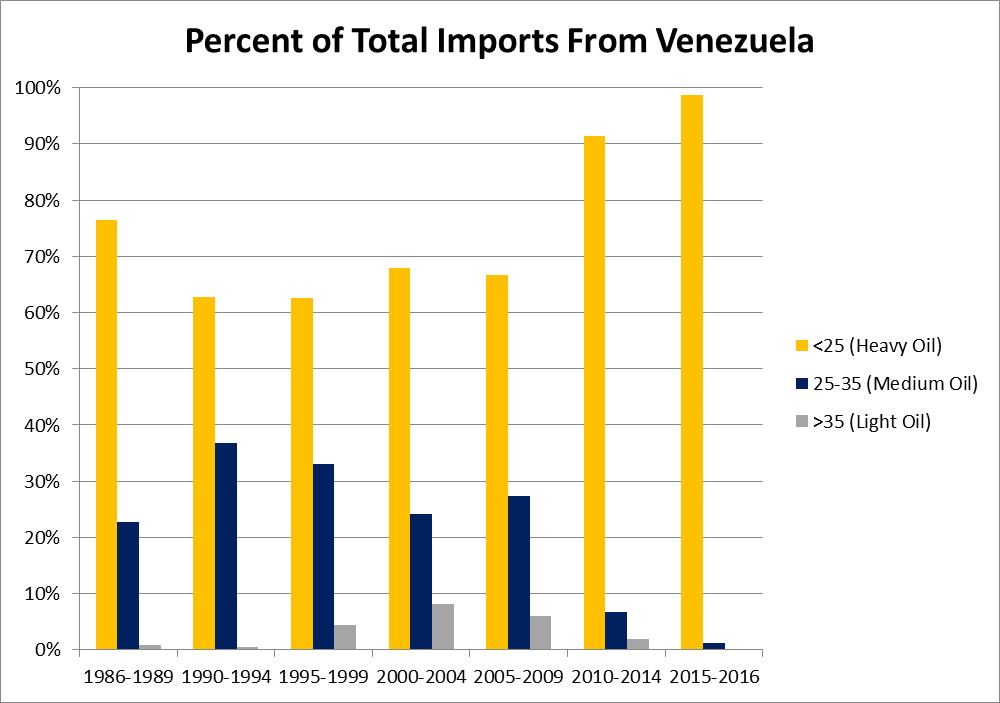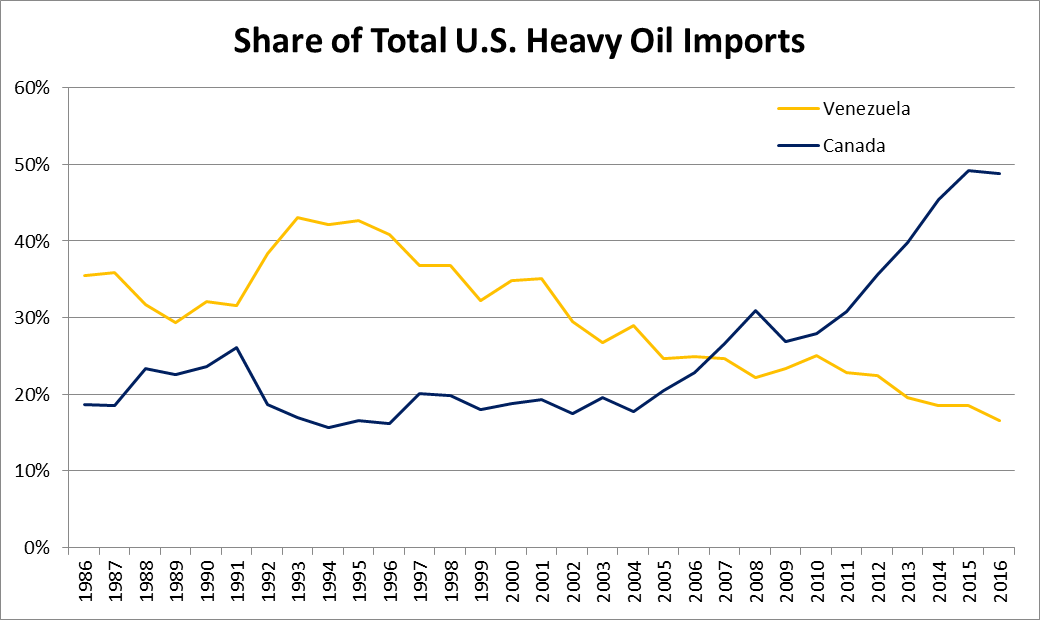Venezuela is third-largest oil supplier to U.S.
The U.S. is mulling sanctions against Venezuela’s oil industry, according to a Reuters report.
Reuters quotes sources saying that U.S. officials are currently evaluating different types of sanctions, and have not decided on what, or whether, sanctions should be imposed. Previous sanctions, which were imposed from 2011 to 2015, prevented PDVSA from bidding on U.S. government contracts. However, potential actions could be as severe as banning oil imports from Venezuela and preventing PDVSA from having activities in the U.S.
Venezuela accounts for 9% of 2016 U.S. oil imports
It is not clear if any potential sanctions would affect Venezuelan shipments of oil to the U.S., but cutting off imports from Venezuela could have important ramifications for the U.S.
Venezuela is currently the U.S.’s third-largest oil supplier, and sent the U.S. 271 MMBO in 2016. Overall, the South American nation has provided the U.S. with about 11.9 billion barrels of oil since 1986, making it the U.S.’s fourth-largest long-term oil supplier.
Last year Venezuela accounted for about 9% of total U.S. oil imports. Its share of the U.S. market has been decreasing since 1996, when Venezuela provided 17.4% of all U.S. oil imports. Volumes from Venezuela have been falling as well. In 2004, The U.S. imported 578 MMBO from the South American nation, more than double current levels.

Imports from Venezuela are almost exclusively heavy oil, as most of Venezuelan production is from heavy, sulfurous fields. The volume-weighted average API gravity of imports from Venezuela was 17.6 °API in 2016. This is significantly below, or heavier, than any other major U.S. oil supplier. Overall the U.S.’s imported oil averages 26 °API.

U.S. may turn to Canada and Mexico to replace Venezuela
U.S. refineries are set up to run a heavier crude slate than the U.S. operators are currently producing domestically, meaning refineries must import heavy grade oil to maintain full utilization. The rise of light oil production from U.S. shale has led to heavy oil dominating American oil imports. The demand for light oil is largely being supplied by U.S. shale producers.
If the U.S. were to cut off imports from Venezuela, American refiners would have to turn to other sources for very heavy crude. Fortunately, the U.S. has two other nearby import partners that could supply heavy oil.
Canadian oil sands production is still on the rise, and the heavy oil produced from these operations could likely easily replace Venezuelan production. In fact, this process is already ongoing. Ten years ago, Venezuela provided about 25% of all U.S. heavy oil imports. Oil with an API gravity lower than 25 is often defined as “heavy oil.” In 2016, this share had fallen to only 17%, the lowest on record.
Canada has seen an opposite change. In 2006, imports from Canada supplied about 23% of all heavy oil the U.S. took in. This share has risen significantly in the last ten years, rising to 49% last year.

Mexico could also supply heavy oil to replace missing Venezuelan imports. Mexico’s production is slightly lighter than Venezuela’s, typically ranging from 20 °API to 25°API instead of from 15°API to 20°API. However, Mexican production is declining, and import volumes from Mexico have dropped by even more than imports from Venezuela.
Venezuelan crisis deepening
The sanctions are being considered in response to the current situation in Venezuela, which has seen significant instability in recent months. Oil exports account for about 95% of all Venezuelan exports according to Reuters, and the government

relies on oil revenue for its operations. The oil price downturn, therefore, significantly disrupted normal activities in the country.
Shortages of food and basic goods are widespread in the country. The government has instituted rationing in an attempt to
combat shortages, but this has not solved the underlying lack of available goods. According to CNBC, consumer prices rose by about 800% in 2016, and the Venezuelan economy shrank by 18.6%. In May the Wall Street Journal reported on the National Poll of Living Conditions, which indicated that about 75% of Venezuelans had lost weight in 2016, by an average of 19 pounds.
Protests have been extensive, and the government has cracked down severely.
According to Reuters, the last two months of unrest have resulted in the deaths of more than 60 people. The harsh actions by the Venezuela government are driving the U.S. to consider sanctions. However, any sanctions imposed may affect not just the nation’s oppressive government, but also the citizens themselves.







